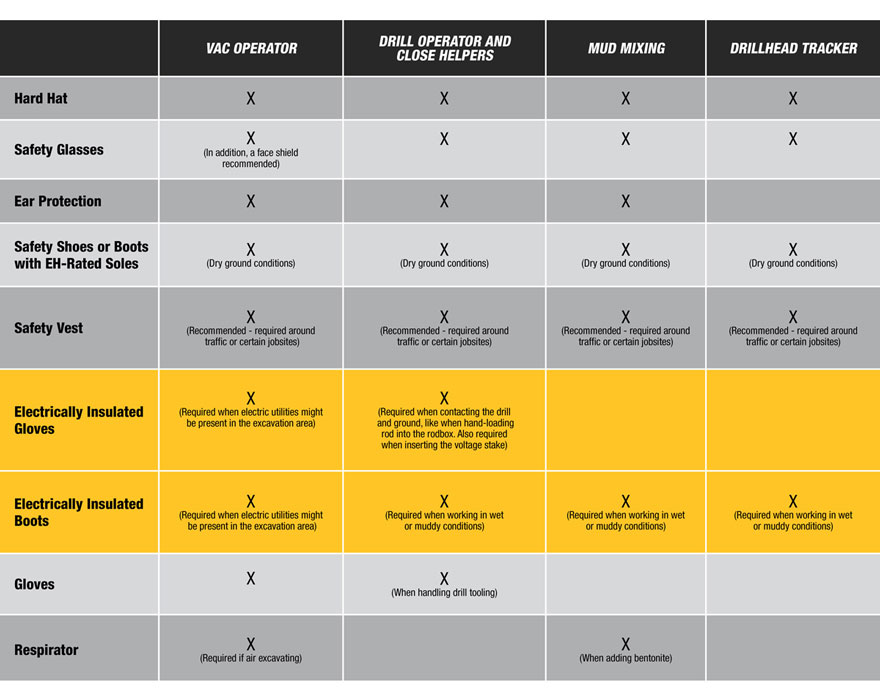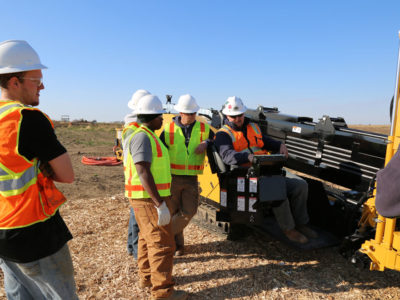Hey rookie, greenhorn, newbie or whatever the crew is calling you on your first few weeks working in horizontal directional drilling (HDD). We’re glad you’ve decided to join the industry because we need hardworking individuals, like yourself, ready and willing to do the important work of installing utilities and pipelines that deliver fiber, water, electrical, gas, sewer service and oil to the world.
Now, you may bring other experience to your first day on the job, but you’ve still got a lot to learn to be a productive and knowledgeable member of the team. So, here are a few tips to get you through the first few weeks on the job and help you make a career out of it.
Be prepared
Your crew members are counting on you to work safely and efficiently every day. Here are a few general areas to pay attention to.
- Be ready to work each morning in the best physical and mental condition possible. What you do when you’re not at work can have an impact on your on-the-job performance. Making good decisions and getting plenty of rest will make the job a lot more enjoyable for you and the rest of your crew.
- Wear appropriate clothing and bring the right gear to the job. You’re working outside (hot or cold) in the dirt around heavy equipment, and you need to wear the proper clothing. There is no casual footwear here. You need a pair of quality steel-toed boots. From the boots on your feet to the hard hat on your head, wear the appropriate clothing for the job you’re doing and the weather conditions. All day, every day, you need to be prepared for any type of weather. There is no time change when there is work to be done. Oh, and don’t forget to wear some sunscreen!
- Lift with your legs, not your back! Those bags of bentonite and shovels full of dirt can get heavy. At the end of the day, your back will thank you for lifting heavy things the right way.
- Respect your surroundings. You’re working around heavy machinery, traffic, open pits and utilities. Be sure to keep your head on a swivel and pay attention to everything going on around you. Don’t crowd machine operators. Pay attention to where you’re walking and look for potential hazards that could impact everyone on the job’s wellbeing.
- Stay hydrated. Energy drinks are tasty but make sure you’re drinking a lot of water throughout the day too.
- Study up: If you’re new to construction, it may be a while before you get behind the controls of the equipment. Do yourself a favor and study up on the operator’s manuals of whatever pieces of machinery you will someday operate.
Wear your PPE
Personal protective equipment (PPE) is critical for on-the-job safety. Your boss or supervisor should tell you what you will need to wear on the job before your first day. OSHA PPE requirements are there to help keep you safe while performing your job.
Here’s a chart to remind you what to wear for the job you’re doing.

Know how to communicate and listen
As a representative of your company and a member of the HDD industry, you need to be able to communicate with your fellow crew members and other people when asked. It’s going to take you some time to learn all the lingo that goes along with HDD. In the meantime, make sure you’re asking questions to help you execute your job correctly and speaking up if you see something that may lead to project delays.
With that said, part of being a good communicator is being a good listener. Pay attention to what your coworkers are telling you. Everyone has their own way of sharing advice, so you may need to listen past how information is delivered and take in what you’re being told. You’ll be better at your job and excel faster if you can do that.
Represent your company and the industry
You’re also going to have to talk to other people from time to time. When you’re working in front of someone’s house or business, there will be questions. Your job is to provide simple answers when appropriate, or you will need to let them know who they should speak with.
And, perhaps even more important than what you say is your actions. You’re a professional, and that requires dressing the part (PPE), working the part (hard and safely), and picking up after yourself while minimizing disruptions for others.
- Don’t litter on the job; dispose of trash at the end of your shift.
- Be respectful of where you park a vehicle whenever possible to ensure people can get around it.
- Mark, barricade and/or cover open holes.
- Make sure the crew is using cones when and where required.
Bonus tip: Write people’s names and phone numbers down on a piece of paper taped inside your hardhat so you have it in the event of an emergency or when you left your phone in the truck.
Work hard and have fun
This type of work isn’t for everyone. When you leave the job for the day, you might have a few blisters, and you’re going to be dirty, but that’s what HDD work is. You’ll also have a lot of days you leave feeling the pride that goes along with putting in a long, hard day of work and seeing just how much you got done.
This HDD industry is filled with outstanding people who deeply care for the important work they are doing. Everyone is glad to have you join the ranks. You’ll make a lot of friends along the way.
Final tip — keep in touch
When you see a truck rolling onto the jobsite with that familiar Vermeer logo on it, be sure to tell the person behind the wheel, “Hi.” Vermeer dealers are here to support the important work you’re doing. If you need anything, give your local rep a call.
Welcome aboard!
Vermeer Corporation reserves the right to make changes in engineering, design and specifications; add improvements; or discontinue manufacturing at any time without notice or obligation. Equipment shown is for illustrative purposes only and may display optional accessories or components specific to their global region. Please contact your local Vermeer dealer for more information on machine specifications.
Vermeer and the Vermeer logo are trademarks of Vermeer Manufacturing Company in the U.S. and/or other countries. © 2021 Vermeer Corporation. All Rights Reserved.
